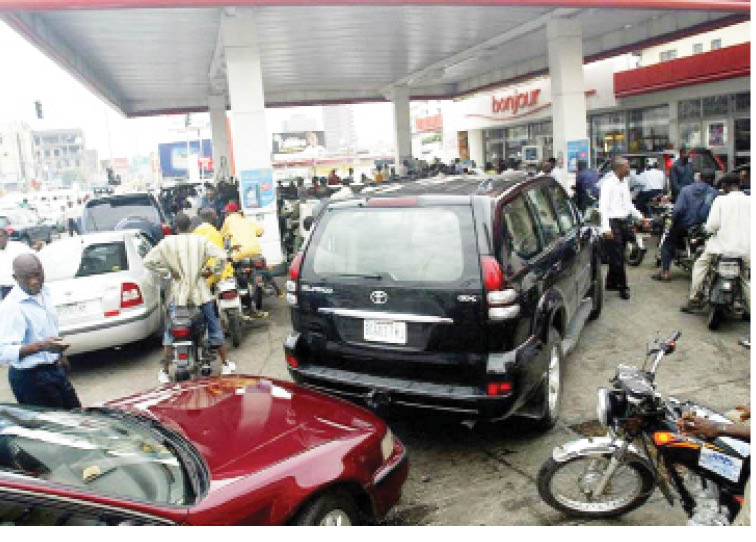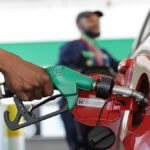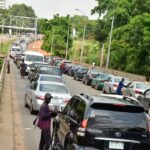Amidst raging queues for Premium Motor Spirit (PMS) also called petrol in Abuja and some states, federal government agencies in the petroleum industry, as well as the product marketers, have traded blame on claims of payment and product loading volume.
Daily Trust reports that the queues in Abuja resurfaced last weekend when it was observed that among over 30 retail outlets, less than five were selling as vehicles lined up to buy petrol.
- Flamingos fly out on Wednesday for World Cup qualifiers against Ethiopia
- Reducing Nigeria’s high maternal mortality rate
The scarcity became worse on Monday as black marketers had a field day selling a 10-litre volume for N2,500 within the city centre.
Aliyu Musa, a driver, who had been at a particular fuelling station for an hour had estimated he could spend another 30 minutes before he would get the product.
“We have been seeing this sign since last week but it was not that bad. However, since Friday, the retail outlets have started drying up in my area around Lugbe,” said Silas John, a commercial driver.
Some retail outlets in Jabi were accused of selling the product to people coming with containers while locking out motorists who were apparently in need of petrol.
“If you go there, you will see how they locked the place but they are dispensing to people who bring kegs while we are in the queue outside the station waiting for them to open the gates and start dispensing to us,” said Abdulateef Jimoh, a commercial taxi driver about one of the retail outlets in Jabi on Tuesday.
However, from Wednesday the vast empty stations began to open their gates to dispense the product in Abuja as they took in fresh consignment but amidst queues. It was observed in the Mararaba area of Nasarawa State, that none of the stations retailing petrol had the product up till Thursday. In a section of the area, two stations sold at the black market rate of N250 per litre as against the approved N165/litre price band with motorists having no option but to queue for the product.
This paper also reported that in Kano, there were relatively short queues at filling stations that were dispensing the petroleum product last weekend while scores of the stations were shut. However, in some of the stations dispensing the product, motorists said some of them had retained a pump price above the approved N165/litre with some of them still selling between N180 to N200/litre.
In Lagos, there were no reports of queues but some retail outlets have also not opened for business indicating that they do not have the product to sell.
As of April 27, the Nigerian Midstream and Downstream Petroleum Regulatory Authority (NMDPRA) said there were 984.236 million litres of petrol in stock capable of lasting for 17 days or slightly above two weeks. “NNPC has 320.487m litres (representing 23% of the entire stock), the Major Oil Marketers Association of Nigeria (MOMAN) has 57.235m litres (just 6% of the stock) while the Depot and Petroleum Products Marketers Association (DAPPMA) has 696.5m litres of petrol (71%).
Also wading into the scarcity, the Nigerian National Petroleum Company Limited (NNPC) issued a statement blaming the low loading of the product from the depots because of the holiday.
The Group General Manager, Group Public Affairs Department of NNPC, Garba Deen Muhammad, said: “The NNPC Ltd notes the sudden appearance of fuel queues in parts of Abuja. This is very likely due to low loadouts at depots, which usually happen during long public holidays, in this case, the Sallah celebrations.
“Another contributing factor to the sudden appearances of queues is the increased fuel purchases, which are also usual with returning residents of the FCT from the public holidays,” it stated.
The company said it had taken steps along with NMDPRA and marketers to ramp up loadouts from all depots.
“We assure all residents of the FCT, and indeed all Nigerians, that we have ample local supplies and national stock in excess of 2.5 billion litres, with the sufficiency of more than 43 days.”
The Group Managing Director of the NNPC, Mele Kyari, afterwards said 300 trucks will supply petrol to the Federal Capital Territory, Abuja between Tuesday and Wednesday to ease the scarcity.
“All truck load-outs are at their maximum today. We believe that this is a very temporary thing. And with over 150 trucks coming into Abuja today and another 150 coming into Abuja tomorrow, it will soon go away,” he noted.
However, as of Friday, some residents in Abuja, Lagos and Kano whom our reporter contacted said more stations, which had remained shut were already dispensing as the queue level relatively declined.
How marketers, NMDPRA differed on N500bn transport debt
An inquest to ascertain the cause of the fresh petrol scarcity starting last weekend raised more concerns for Nigerians as oil marketers and NMDPRA during the week differed on the payment of bridging or transport claims.
An official of the Independent Petroleum Marketers Association of Nigeria (IPMAN) revealed that most of its members were awaiting the loading of the consignment from the depots.
“The long break affected loading of products from the depots and that explains the queues you said you have seen in Abuja. Hopefully, as work resumes in earnest from Monday, the NARTO will begin to load products for us to our stations,” the official noted.
While this was a position of a member of the national chapter of IPMAN in Abuja, the Kano chapter of IPMAN told Nigerians to prepare for the worst fuel crisis if the federal government or the NMDPRA fails to pay its members’ outstanding bridging claims of over N500 billion.
IPMAN Chairman in Kano, Bashir Danmalam, on Monday said the failure of the NMDPRA to pay its members the bridging claim, otherwise known as transportation claim, had forced members out of business as they couldn’t transport the commodity due to the high cost of diesel.
The chairman explained that non-payment of the claims by the agency for nine months had crippled the businesses of many members of the association as they could not transport the commodity even though it was available.
“Many marketers cannot transport the product because their funds are not being paid. Despite the high price of diesel, they manage to supply the petroleum products nationwide. The resurfacing of fuel queues in Abuja is just a tip of the iceberg with regard to the petroleum scarcity,” he warned.
The chairman further revealed that, out of 100 per cent, only five per cent of the marketers can supply the petroleum products because of the outstanding debt.
Danmalam said since the merging of DPR, PEF and PPRA to NMDPRA in October 2021, members of IPMAN had received payment just twice.
In a swift reaction, NMDPRA on Thursday said it paid N58 billion as bridging claims to oil marketers in the last six months.
“Since December 2021, the NMDPRA has made several payments to marketers whose claims have been verified. So far, over N58 billion has been disbursed to oil marketers out of which about N34 billion went directly to members of IPMAN.
“We wish to stress that the total amount disbursed so far is the highest ever paid within a six-month span by previous fund administrators, which implies that the reimbursement of marketer’s transportation differentials for petroleum products movement from depots to sales outlets is a priority to the NMDPRA,” it explained.
The authority also said the administration of bridging payment is a continuous process as hundreds of trucks load and discharge products daily thereby adding to the claims.
It also said freight rates were recently reviewed upwards to reflect current market realities and stimulate investments in the transportation of petroleum products to ensure uninterrupted distribution.
The authority then admitted that some of the pending payments were due to the reluctance of marketers to reconcile their claims, in spite of the authority’s continuous appeal to come for reconciliation whenever there are discrepancies.
It however assured that NNPC has sufficient petrol to last over 47 days, translating to about 2.65 billion litres to stabilise the fuel scarcity in some states.
“Some loading depots have been directed to operate on extended hours to enable increased truck-out. In the interim, the vessel discharge operations have been reviewed to fast-track truck loading and distribution in order to meet increased demand,” said NMDPRA.
Full liberalisation will end bridging claims, scarcity – Expert
On the way forward, Engr. Ochube Onuh of Green Energy, an oil servicing and logistics firm, said only liberalisation of petrol trading and the removal of subsidy can solve the problem.
He said, “Look at diesel, I don’t think the government pays bridging claims to the marketers because its sales have been liberalised. That would be the best thing for petrol though people may suffer at the start.
“Fortunately, the Petroleum Industry Act (PIA) has set a pace for that, it’s just a matter of time for the implementation,” said Onuh.
He also added that the petrol scarcity is already vanishing in Abuja. “The queues have reduced as more logistics firm have been engaged to drive them loading of products.”

 Join Daily Trust WhatsApp Community For Quick Access To News and Happenings Around You.
Join Daily Trust WhatsApp Community For Quick Access To News and Happenings Around You.


